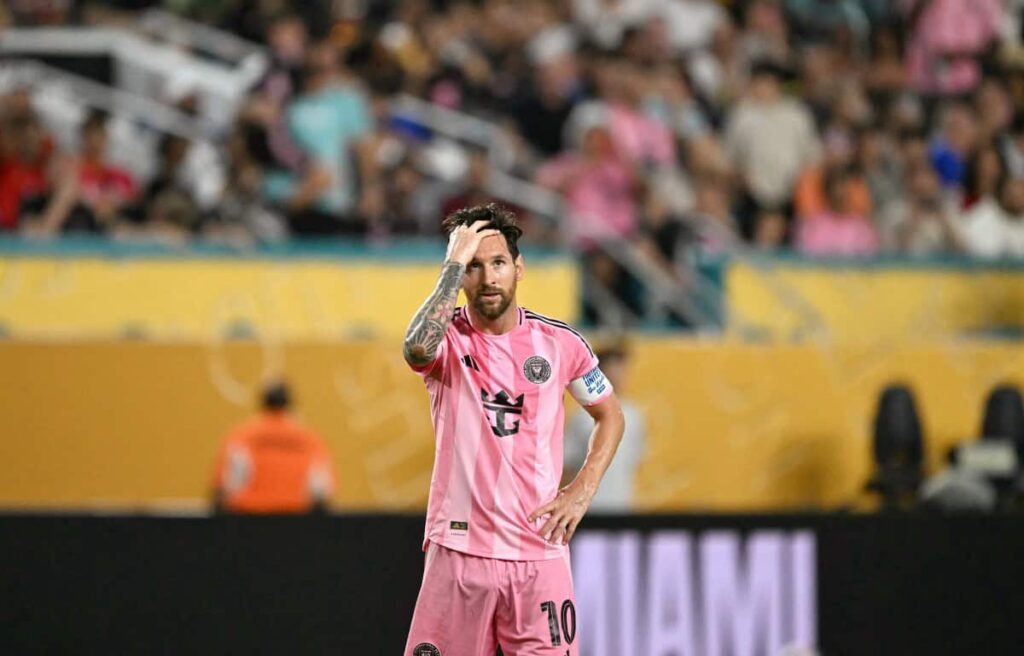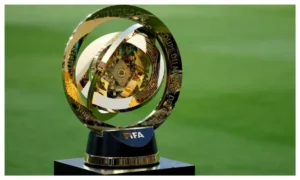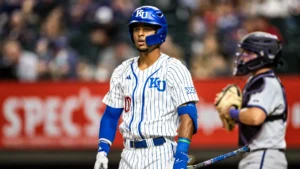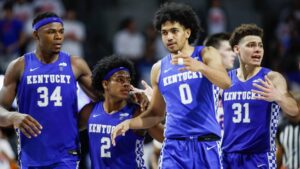
Lionel Messi turned 38 years old on June 24, 2025, a milestone that should have been another glittering chapter in a storied career, another chance for the world to witness the enduring genius of football’s most celebrated icon. Yet, as Inter Miami defeated Brazilian side Palmeiras 2-0 in what many anticipated would be a Messi showcase, the greatest player of his generation left the pitch without scoring, without assisting, and without truly imprinting himself on the match. For all the noise around his birthday, Messi’s performance was defined by an unsettling quiet.
It would be a mistake to label the game itself uneventful. Inter Miami played solidly, disciplined in their structure, smart in their pressing, and clinical when it mattered. The two goals, scored by younger members of the squad, gave the home fans plenty to cheer about. But amid the joy of victory, a strange narrative took hold. It wasn’t about the win. It wasn’t about the goals. It was about the man who didn’t score, the man whose shadow loomed over the entire event: Lionel Messi.
The very idea that a player who turned 38 should be expected to dazzle as if he were 28 might seem unfair. But this is Messi we are talking about. Expectations for him were never built on fairness, but on awe. He created the mythology around himself through years of brilliance, defying age, logic, and tactics. Every touch became a moment. Every goal, a masterpiece. Every birthday, a stage. But in this match, on this day, Messi was unremarkable. And in being unremarkable, he became controversial.
For many fans, the silence from Messi during the match raised troubling questions. It wasn’t that he missed a clear chance or delivered a poor performance; it was that he seemed invisible. The man who once carried Barcelona, who lifted Argentina to World Cup glory, who redefined the role of a playmaker, now found himself floating on the periphery of a match against a club team from Brazil. His teammates did the work. He strolled, he passed safely, he avoided risks. He looked, for the first time in a long time, like a man simply going through the motions.
The problem is not that Messi failed to score on his birthday. It’s that the failure felt so deliberate, so detached, that it sparked whispers many have been afraid to voice. Has Messi finally lost the fire? Is he still playing because he loves the game, or because his brand requires it? When he moved to MLS, it was hailed as a new chapter, a chance to grow the game in the United States, to inspire a new generation. But what happens when the legend ceases to inspire?
This wasn’t just any opponent. Palmeiras came to Miami with pride and pedigree. They are a top side in Brazil with a growing reputation in continental football. Messi has made a career out of performing in big games, on big stages, against big teams. But in this moment—at home, on his birthday, against a worthy opponent—he faded into the background. It was not simply a missed opportunity; it was a symbolic void. A moment that was supposed to reinforce his immortality only underscored his mortality.
What makes this silence controversial is not just Messi’s legacy, but the way it continues to shape how fans and media treat him. Had any other star failed to deliver on such an occasion, the criticism would be immediate and unforgiving. But with Messi, there is a protective aura. Critics are hesitant. Analysts tiptoe around the truth. Fans rationalize and deflect. And in doing so, they do him a disservice.
The real controversy lies in this question: Should Messi still be judged as a footballer, or is he now a living monument, untouchable and immune to scrutiny? The myth of Messi has become so entrenched that any critique is seen as sacrilege. But myths must be confronted when reality shifts. And the reality is this: Messi did not look like a world-class player against Palmeiras. He looked like a 38-year-old athlete playing out the final stages of his career in a league where he is more spectacle than competitor.
To acknowledge this is not to disrespect Messi. His career is unmatched, his achievements legendary. But no career, no matter how brilliant, is infinite. The danger lies in pretending otherwise. There is a fine line between honoring a legend and clinging to an illusion. Messi not scoring on his 38th birthday is not a tragedy, but what it represents might be. The silence wasn’t just about a lack of goals—it was about a shift in narrative. The magician didn’t pull a rabbit from the hat. He barely lifted the wand.
Some will argue that it’s unfair to demand a goal simply because of a date on the calendar. But that argument ignores the reality of modern football and Messi’s global persona. His birthday has become a spectacle unto itself. It’s marketed, celebrated, and elevated into a kind of ritualistic experience. Fans expect magic. Brands build campaigns around him. Clubs issue commemorative posts. The world tunes in hoping for something unforgettable. And when nothing comes—when there is no flicker of genius—disappointment quickly morphs into discomfort.
Perhaps most disquieting was Messi’s demeanor. He didn’t look frustrated. He didn’t look angry with himself. He didn’t seem to care that the spotlight had shifted to others. There were no protests, no visible hunger to change the script. It felt like he had made peace with being a supporting act on his own stage. That serenity might be admirable to some, but to others, it is a sign that the Messi of old—hungry, defiant, insatiable—is gone for good.
This raises another point that fans are reluctant to discuss: is Messi’s presence on the pitch becoming more of a hindrance than a help? In the Palmeiras game, Miami moved the ball more fluidly when others took the initiative. The goals didn’t come from Messi’s creativity or dribbling. They came from a team functioning without him at the center. If Inter Miami is to grow as a competitive team in real football terms, they may need to start building around players other than Messi. That, in itself, is a controversial and even blasphemous idea to some—but it might soon become a necessity.
There is also the broader question of what Messi’s endgame looks like. Is he aiming to play in the next Copa América? Is the 2026 World Cup truly on his radar, or just a romantic fantasy kept alive by fans and sponsors? Based on his performance against Palmeiras, the idea of Messi dominating on the world stage again feels increasingly out of reach. It is not that he lacks intelligence or technical ability. It’s that the physical tools to execute at the highest level seem to be eroding. He still has the vision. But vision without execution becomes nostalgia.
What made this birthday performance so poignant is that Messi didn’t even try to force the issue. There was no desperation to make a statement. No hint that he felt the burden of the occasion. For someone whose entire career has been about rising to the moment, this felt like a conscious decision to step aside. The world was watching. And Messi chose to blend in.
It is difficult to say what comes next. Perhaps he bounces back with a stunning free-kick next match. Perhaps this was just an off day. But what made this match so controversial was not the result or the scoreline. It was the realization that even the greatest cannot outrun time. And when the man who defied physics, tactics, and age begins to look ordinary, the silence becomes louder than any cheer.
Lionel Messi’s 38th birthday was supposed to be a celebration of everything he still is. Instead, it became a reminder of what he no longer is. And while Inter Miami won the match, football as a global narrative took a subtle loss. Because when Messi plays, we expect magic. When he doesn’t, it’s not just a quiet game—it’s a rupture in the myth. And that rupture is growing harder to ignore.







